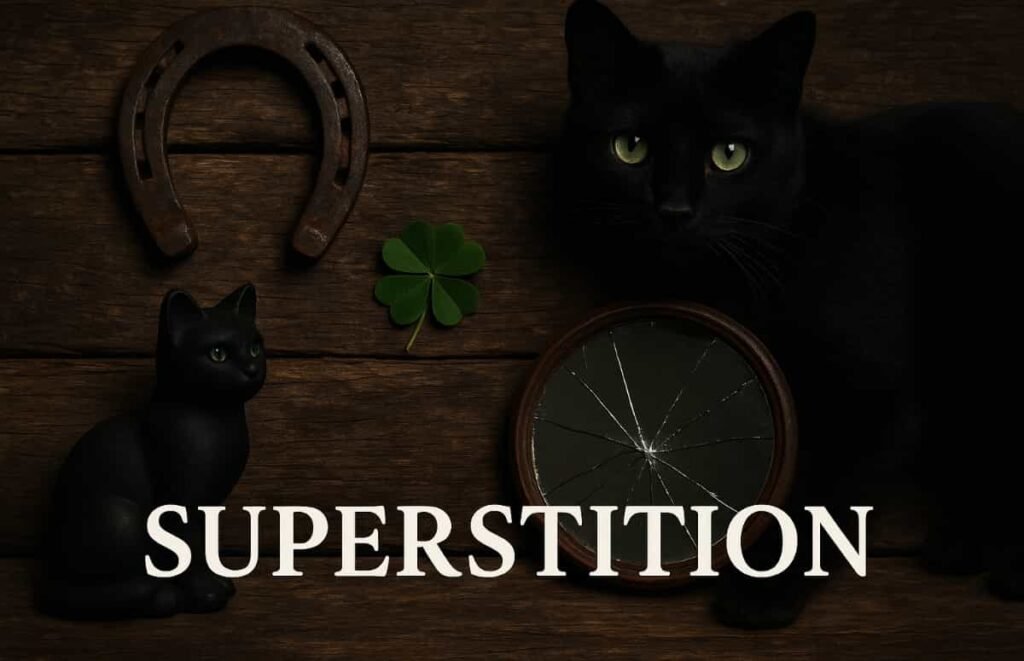Superstition English Paragraph: 200 & 400 Words

Superstition English Paragraph: 200 Words
Irrational beliefs or practices often arise from fear, ignorance, or cultural traditions. These beliefs are not based on scientific reasoning, yet they influence the behavior of people around the world. Common examples include the fear of black cats, walking under ladders, or believing that breaking a mirror brings seven years of bad luck. In many societies, superstitions have deep historical roots and are passed down from one generation to the next.
Superstitions are often used as a way to explain events that people cannot otherwise understand. For instance, if someone experiences a string of bad luck, they might blame it on a broken mirror or a cursed object. This mindset provides comfort and a sense of control, even when there is no real cause. In rural communities, especially, superstitions are sometimes tied to religious or spiritual practices. People may perform rituals or avoid certain actions to ward off bad luck or evil spirits. While some superstitions may seem harmless, others can lead to fear, discrimination, and even violence. Therefore, it is important to question irrational beliefs and rely on logic and science. Understanding the psychological and cultural roots of superstition helps us grow as a more rational and compassionate society.
Superstition Paragraph: 400 Words
Superstition is the belief in supernatural causality, where one event causes another without any logical or scientific connection. These beliefs are often deeply ingrained in culture, religion, or community practices and are passed down through generations. People across the globe engage in superstitious behavior, sometimes without even realizing it. Touching wood to ward off bad luck, carrying lucky charms, or fearing the number 13 are all examples of how superstition subtly influences our lives.
The origin of many superstitions lies in ancient times when humans lacked scientific understanding. They tried to make sense of natural events through stories and rituals. For example, eclipses were once thought to be signs of disaster. Even today, in many places, people believe in omens and signs that supposedly predict the future. In some cases, superstitions offer a psychological cushion. They help reduce anxiety by giving a sense of control in uncertain situations. Athletes wearing the same socks during every game or students carrying lucky pens during exams are modern-day examples.
However, superstition is not always harmless. It can reinforce ignorance, fear, and bias. In extreme cases, it can lead to harmful practices, such as witch-hunting or social exclusion. Moreover, relying too much on superstition can prevent people from seeking logical solutions or scientific facts. Education plays a vital role in reducing the influence of superstitions. Schools and media must encourage critical thinking from an early age.
Despite the rise of science and technology, superstitions persist. Social media and popular culture often romanticize such beliefs, making them seem innocent or even fun. But it is essential to distinguish between harmless traditions and beliefs that cause harm. As a society, we should respect cultural heritage but also challenge outdated or dangerous ideas. Learning to question and investigate can lead to a healthier and more informed mindset.
In conclusion, superstition is a fascinating yet complex aspect of human behavior. While it reflects our need for comfort and meaning, it also highlights the importance of education, reason, and awareness. By understanding its roots and effects, we can move towards a world guided more by logic and less by irrational fear.
FAQ
Answer: Superstition is a belief that certain actions or events can bring good or bad luck without any logical reason. Common examples include knocking on wood, avoiding black cats, and not walking under ladders.
Answer: People believe in superstitions because they offer comfort, tradition, and a sense of control in uncertain situations. Cultural upbringing and fear also play a major role.
Answer: Superstition can influence behavior, create fear, and sometimes promote harmful practices. It may also prevent people from making logical or scientific decisions.
Answer: Yes, even in modern times, many people follow superstitions, whether knowingly or not. Rituals, lucky charms, and spiritual practices still exist in many cultures worldwide.